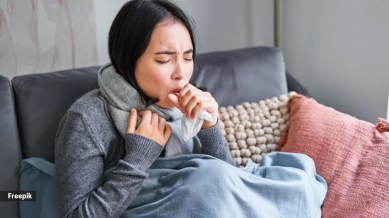📣 For more lifestyle news, click here to join our WhatsApp Channel and also follow us on Instagram
H3N2: The virus affecting ’69 per cent’ families in Delhi NCR
Remember that you don’t have to take medication on your own. Follow the doctor’s advice

There have been reports of a surge in cases of the H3N2 virus, which belongs to the Influenza A family, especially among families in Delhi NCR. “H3N2 is surely rising now as more are having fever and symptoms such as sore throat, runny nose,” said Dr Manjusha Agarwal, senior consultant, internal medicine, Gleneagles Hospital, Parel, Mumbai.
Reports indicate that the spread has extended beyond Delhi-NCR, and increasing numbers of households across states are reporting flu-like illness.
monthly limit of free stories.
with an Express account.
“Although not all cases are tested, the increasing numbers make it clear that the virus is circulating extensively,” Dr Rituja Ugalmugle, consultant, internal medicine, Wockhardt Hospitals, Mumbai Central, told indianexpress.com.
A LocalCircles survey pointed out that 69 per cent of households surveyed in Delhi NCR currently have one or more individuals with Covid/flu/viral fever-like symptoms. Notably, the survey compared the results of September 2025 to their last survey conducted in March 2025 to find out the influenza impact in Delhi NCR. The survey, with over 11,000 responses from residents of Delhi, Gurugram, Noida, Faridabad, and Ghaziabad, recorded 63 per cent male respondents and 37 per cent female respondents.
What is H3N2?
Dr Agarwal said H3N2 influenza is a seasonal flu strain that spreads quickly, especially during weather changes. “The symptoms often start like a common cold but can worsen if not addressed early,” said Dr Agarwal.
These can be attributed to seasonal changes, fluctuating temperatures, and reduced immunity in the community, said Dr Mayanka Lodha Seth, chief pathologist, Redcliffe Labs. “These are all the factors that allow respiratory viruses to spread more easily. Unlike the common cold or regular flu, H3N2, which is a subtype of Influenza A, is often more severe and tends to last longer. If you have been suffering from a cough or cold for more than 48 hours, it’s time to consult your doctor without delay,” said Dr Seth.
What are the typical symptoms of H3N2?
Sudden high fever with chills, sore throat, runny nose, cough, headache, body aches, and fatigue are common initial signs. “In some patients, muscle pain is also reported,” said Dr Ugalmugle.
Difficulty breathing, chest pain, bluish lips or nails, confusion, dizziness, or dehydration can signal complications. “If fever does not subside after several days despite medicines, medical care should be sought immediately,” said Dr Ugalmugle.
Since these symptoms tend to overlap with other viral infections, it is important not to ignore them, particularly if they last longer than a week, stressed Dr Agarwal.
“In certain cases, H3N2 can lead to pneumonia, bronchitis, or worsening of existing heart and lung diseases. If you develop a persistent high fever, shortness of breath, or chest pain, seek immediate medical help,” emphasised Dr Agarwal.
Who is at higher risk?
Children, the elderly, pregnant women, and people with chronic health conditions like asthma, diabetes, or heart disease are more vulnerable. Children may also show nausea, vomiting, or diarrhoea in addition to respiratory problems, said Dr Ugalmugle.
How is H3N2 diagnosed?
The majority of cases are diagnosed clinically, but physicians may prescribe lab tests such as throat swabs or rapid influenza diagnostic tests as necessary to confirm the virus.
What is the treatment?
There is no single cure for H3N2, Dr Ugalmugle said. “Treatment consists primarily of rest, fluids, and medications to lower fever and relieve discomfort. Antiviral medication may be provided in severe cases or for high-risk individuals,” said Dr Ugalmugle.
Can it be prevented?
Paying close attention to symptoms is the first step in controlling the spread of H3N2 and protecting vulnerable groups like children, elderly people, and those with weakened immunity. “Additionally, remember that you don’t have to take medication on your own. Follow the doctor’s advice and you will be able to recover soon,” said Dr Agarwal.
Good hygiene is crucial. “Frequent handwashing, mask use when out in public, avoiding close contact with the sick, and maintaining immunity through a good diet and sleep are crucial measures. Vaccination against the flu season is also recommended,” said Dr Ugalmugle.
Timely recognition, care, and preventive habits can make the difference between a quick recovery and serious complications.
DISCLAIMER: This article is based on information from the public domain and/or the experts we spoke to. Always consult your health practitioner before starting any routine.
📣 For more lifestyle news, click here to join our WhatsApp Channel and also follow us on Instagram